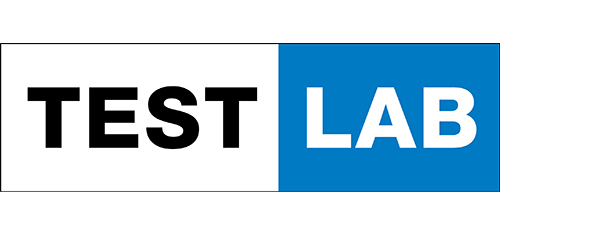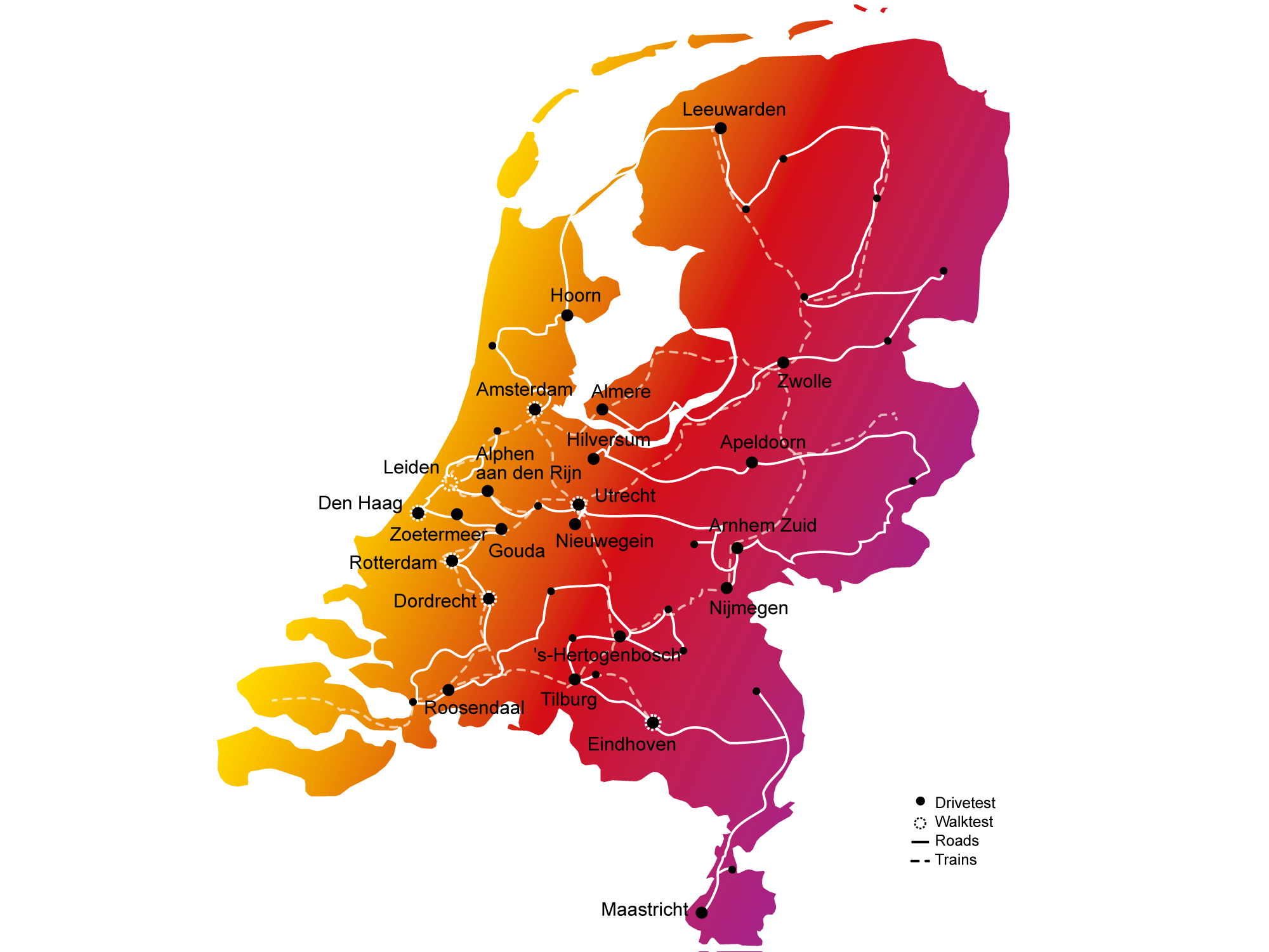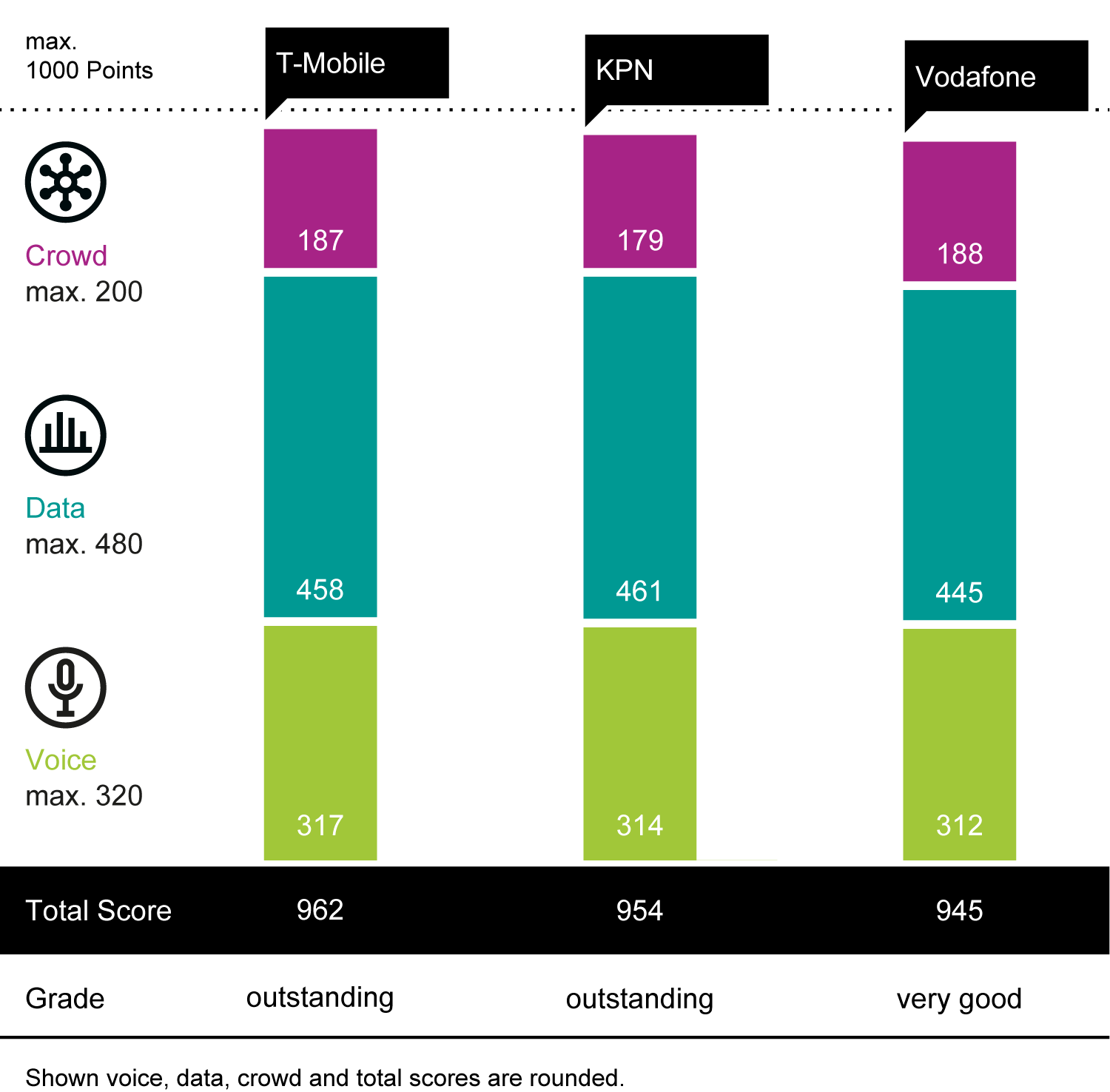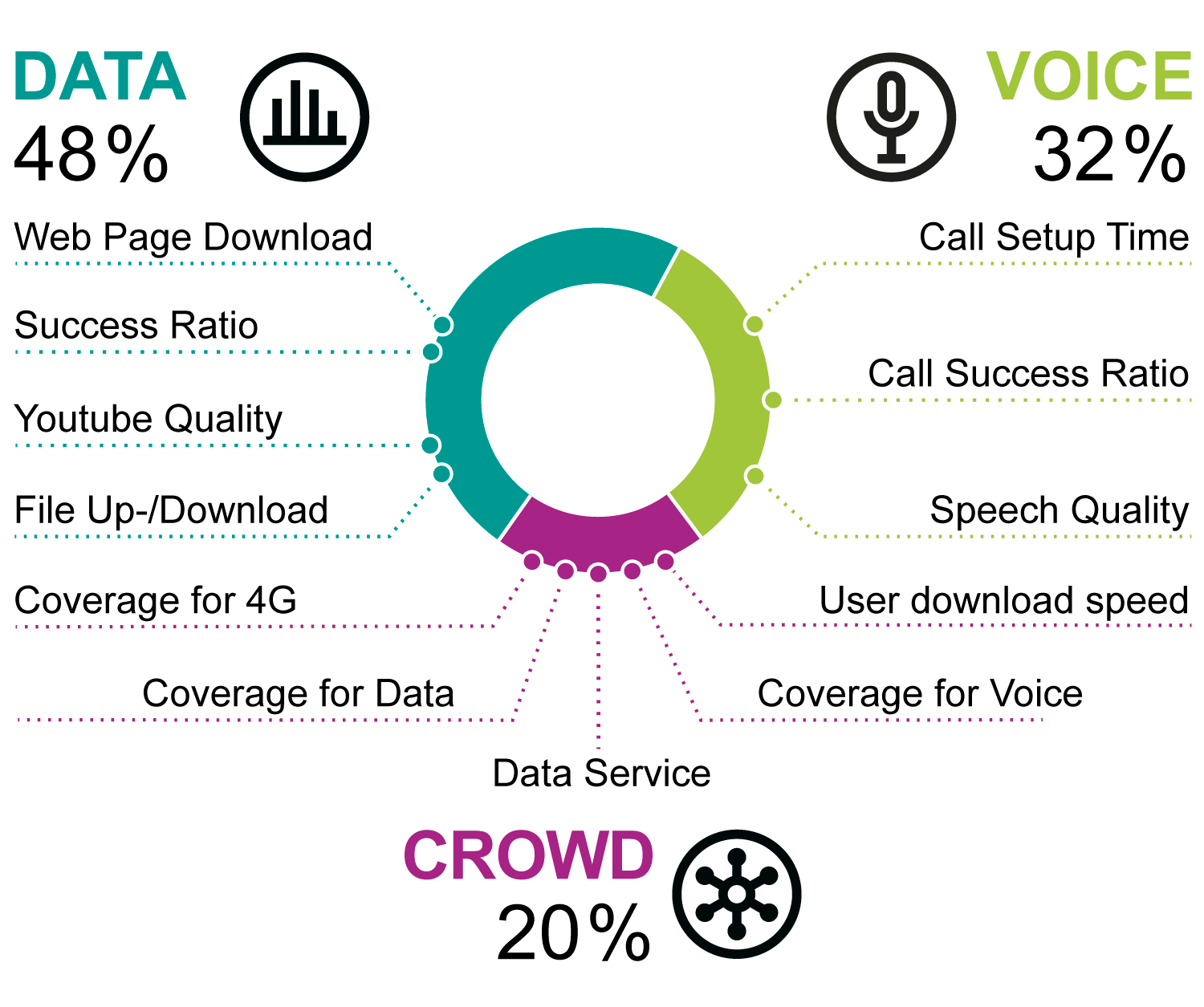Download English PDF version of the test here
The 2021 Mobile Network Test in the netherlands
For the sixth time, the benchmarking expert umlaut and connect magazine have conducted their authoritative benchmark of the mobile networks in the Netherlands. Once again, we seized the opportunity to further enhance the underlying methodology.
In a marketplace characterised by very strong performances, the competition takes place on a high level. With the arrival of 5G and their ongoing expansion of 4G networks, how do the three Dutch operators perform this time?
KEY FINDINGS
For the fifth time in a row, T-Mobile wins the umlaut connect Mobile Benchmark in the Netherlands and also achieves the highest score
determined by umlaut worldwide in 2020. With the grade “outstanding“, the same as the test winner, KPN ranks second and achieves connect‘s 5G Innovation Award. Vodafone ranks third with the grade “very good“.
umlaut‘s network benchmarks are widely accepted as the de-facto industry standard and for being highly objective. The carefully designed methodology of our 2021 benchmark in the Netherlands reflects umlaut‘s holistic approach to network benchmarking. Its benchmarks combine drivetests and walktests to execute detailed voice and data measurements under controlled circumstances with a sophisticated crowdsourcing approach. This provides profound insights into the
overall coverage of voice and data (with focus on 4G and 5G) services, real-world User Download Speeds and the Quality of Broadband Service. The drivetests and walktests allow for evaluating the maximum of the networks‘ capabilities. Crowdsourcing reveals the service quality and performance actually experienced by real users. We have thoroughly weighted these components in order to give a realistic and authoritative assessment of the rated networks‘ true potential and performance.
Even in the time of the Corona pandemic, our analyses showed that the networks remained stable, though with somewhat altered customer usage patterns. When conducting this year‘s benchmark, we have of course carefully adapted the logistics to ensure maximum safety for our team members.
T-MOBILE IS THE OVERALL WINNER, KPN FOLLOWS AT A
DISTANCE OF EIGHT POINTS, BOTH ARE “OUTSTANDING“
T-Mobile managed to continue its winning streak, scoring best in the umlaut connect Mobile Benchmark in the Netherlands for the fifth time in a row and also achieving the highest score determined by umlaut worldwide in 2020. The win is achieved by a lead over KPN in the Crowdsourcing category, also T-Mobile scores best among all three competitors in the Voice category. KPN achieves the best results in the Data category and the second best in Voice, but falls a little behind in the Crowdsourcing score. Vodafone ranks third both in Voice and Data, but achieved the strongest Crowdsourcing results, scoring one point more than the overall winner T-Mobile.
In comparison to the results of the 2019 umlaut connect Mobile Benchmark in the Netherlands, which was published in spring 2019, all three operators have lost some points. This is not uncommon
especially in countries with a very high performance level, as we continually raise the thresholds of our scoring in order to keep track with the technological advancement. Also, the Crowdsourcing methodology was significantly updated, which makes the results in this discipline not 1:1 comparable to those of our previous benchmark.
T-Mobile is the overall winner, with KPN following at a distance of eight points. T-Mobile leads in Voice, KPN in Data. Both operators achieve the grade “outstanding“. Vodafone follows on third place, scoring 9 points behind KPN and closely leading the field in the crowdsourcing category.
THE DUTCH operators
Traditionally, the mobile operators in the Netherlands compete on the highest performance level. The most recent mergers and acquisitions resulted in a noticeable change of market shares. According to the customer numbers published by the operators, T-Mobile is now the largest Dutch mobile operator, sending KPN and Vodafone to second and third place in terms of customer base.
In 2000, Deutsche Telekom bought a minority of the Dutch mobile network operator Ben, which was later extended to a 100 per cent acquisition. In 2003, Ben was renamed
T-Mobile Netherlands, with the brand “Ben“ becoming a “no-frills“ offer within its portfolio. In 2007, T-Mobile NL additionally acquired Orange.
At the end of 2018, the company completed its acquisition of the smallest Dutch mobile operator, Tele2. By now, also the technical infrastructure of the formerly separate carriers has been merged, with Telekom holding 75 per cent and Tele2 holding 25 per cent
of the assets. At the end of its fiscal year 2019, T-Moble Netherlands reported a revenue of 1.9 billion Euros and 5.6 million mobile subscribers. In late 2020, the company continued its series of acquisitions by absorbing the former MVNO Simpel, increasing its mobile customers to 6.7 million, making T-Mobile the largest Dutch mobile operator.
T-Mobile‘s network offers 2G mostly at 900 MHz, 3G at 2100 MHz and 4G/LTE at 800, 900, 1800, 2100 and 2600 MHz. Its 4G network supports both VoLTE as well as “4G+“ (carrier aggregation) up to 1 Gbps.
T-Mobile launched 5G soon after the end of the spectrum auction in July 2020. At the end of October 2020, T-Mobile claimed that 90 per cent of the Dutch population lived within its 5G coverage area.
The Koninklijke PTT Nederland N.V. emerged from the privatisation of the formerly state-owned PTT in 1998.
For its fiscal year 2019, the company reported a total revenue of 5.5 billion Euros as well as 6.5 million mobile customers. In addition, KPN reports 3.3 million fixed broadband and 2.2 million interactive TV customers.
The company focuses on marketing its KPN brand, however with Simyo, Telfort and Ortel it also has offerings in the “no-frills“ segment.
KPN operates 2G/GSM at 900, 3G/UMTS at 900 and 2100 MHz and 4G/LTE at 800, 1400, 1800, 2100 and 2600 MHz. 3G is scheduled to be phased out by the end of 2021.
4G is operated with VoLTE as a standard as well as with “carrier aggregation”, which enables theoretical download speeds of up
to 1 Gbps.
KPN launched 5G at the end of July 2020, starting in most of the so-called Randstad area (Amsterdam, Rotterdam, The Hague and Utrecht) as well as Eindhoven, reaching about
half of the Dutch population. The operator strives to reach nationwide 5G coverage
in 2021.
The Dutch subsidiary of the international Vodafone Group acquired the operator Libertel in 2003, forming Vodafone Netherlands. In 2016, it merged with the cable and fibre operator Ziggo. Today, 50 per cent of the joint company VodafoneZiggo
is owned by the Vodafone Group and another 50 per cent by Liberty Global. Currently, VodafoneZiggo is the smallest mobile operator in the Netherlands, reporting about
5.1 million mobile customers. The company also specifies 3.9 million fixed (broadband, video and telephony) subscribers.
For its financial year 2019, VodafoneZiggo announced a turnover of 3.9 bn Euros, of which 1.4 bn were gained in its mobile business.
The company operates 2G networks
at 900 and 1800 MHz, 3G at 2100 MHz
and 4G/LTE at 800, 1800, 2100 and 2600 MHz. It was the first Dutch operator to phase out 3G in order to devote its spectrum to 4G and 5G. VoLTE is supported all over its 4G network, and with “4G+“ the operator offers carrier aggregation up to 1 Gbps.
Already at the end of April 2020, VodafoneZiggo was the first carrier of offer 5G all over the Netherlands, starting on already available frequencies and later extending the service to spectrum acquired in the frequency auction which had ended in July 2020. In late 2020, VodafoneZiggo claimed to already reach 80 per cent of the Dutch population, aiming at reaching national coverage soon.
Note: All claims about network coverage reported here are based on the operators’ own statements, and are in no way benchmark results determined by umlaut.
A CLOSE LOOK AT THE DUTCH NETWORKS
The network benchmarks conducted by umlaut and connect are widely accepted as a completely objective authority. Shortly before the beginning of 2021, we present the umlaut connect Mobile Benchmark in the Netherlands for the sixth time, with a further enhanced methodology.
umlaut, based in Aachen, Germany, is a world leader in mobile network testing. The company was formerly known as P3 and changed its name in fall 2019 in the course of restructuring and refocusing its activities. umlaut has over 4,500 employees, distributed over about 50 locations all over the world, and a turnover of more than 400 million Euros.
umlaut is partnering with the international telecommunications magazine connect, which has more than 25 years of editorial expertise
and is one of the leading test authorities in Europe for telecommunications products and services. Together, umlaut and connect have been conducting the most important network benchmark test in Germany
for more than 15 years, extending it to other European countries since 2009. As the de-facto industry standard, umlaut‘s benchmarking methodology focuses on customer-perceived network quality.
Conducting the 2021 umlaut connect Mobile Benchmark in the Netherlands was certainly challenging in the light of the Corona pandemic. But the drivetest and walktest teams managed to realize all planned measurements in November 2020, covering a total of 5,760 km and approx. 36.3 per cent of the Dutch population. In addition, the score includes the results of extensive crowdsourcing analyses considering 24 weeks from late May to early November, 2020.
Hakan Ekmen,
CEO Telecommunication at umlaut
Congratulations to the Netherlands and T-Mobile being “best in test” for the fifth time in a row in our
umlaut connect Mobile Benchmark. Again, all operators are showing excellent performances of their networks.
On top, we already see a very good 5G coverage and performance in the Netherlands.











